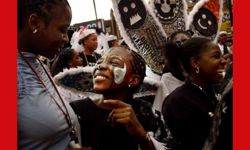
Not all protests are hate marches…
I went to the theatre in London on Armistice Day. Ian McEllen and Roger Allam. Splendid. But that’s by the by. This was the day, you will recall, when it was vital that our sacred remembrance weekend should be respected. By the hate marchers. It would, you will also recall, be on the Met’s head if violence broke out.
There were indeed scuffles that day – involving far-right demonstrators “protecting” the Cenotaph from the pro-Palestinian “mob” who were busy helping Michael Gove with his photo opportunity a mile or so away. Most of the rest of the tens of thousands protesting about the scale of Israel’s retaliation for the Hamas massacre and kidnapping of its citizens went about their business peacefully, if noisily.
I met some of those demonstrators on the Tube. A grey-haired lady with specs and an academic air, her husband with his little backpack and water flask, another woman with the sort of “good hair” that comes only with breeding. The sorts of people the Mail and Telegraph and Express like to think they’re speaking to. They weren’t anti-Jewish. They didn’t question Israel’s right to exist. But they also didn’t want Israel to bomb innocent civilians. And they felt strongly enough about that to get on a train to the capital and to march to say so.
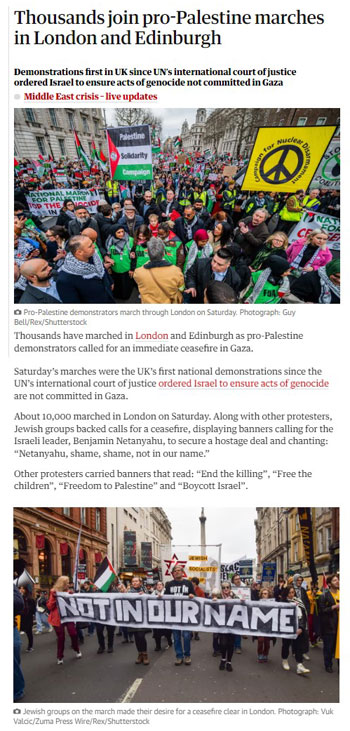
Marches in support of the Palestinians have continued through the winter, though not on that scale, and they are costing us a lot of money in policing – up to £25m, according to figures published this week. It’s hard to get a handle on how many are turning out week after week; about 20,000 did so for the first “national day of protest” at the beginning of this month – notably including Jewish groups carrying “Not in my name” banners – but it’s fair to assume that it’ll be the diehards rather than my “rally tourist” Tube companions who make a date every Saturday.
It's quite a leap, though, to characterise people you haven’t bothered to check on as a hate-filled mob, as some politicians and some papers are doing. Here’s Tuesday’s Sun leader:
What would the hate marches have to do to get banned?
They are already [sic] eruptions of anti-Jewish racism, with calls for genocide and bloody revolution and blatant support for banned terror groups.
And they are crippling the police, consuming 26,121 Met shifts and nearly £19million since October 7. The bill nationwide is more than £25million.
Not that you'd know where all that went, given the tiny number of thugs being nicked. Their unchecked anti-Semitism has caused almost half of British Jews to consider emigrating, a survey reveals. That shames Britain.
And it shames the politicians and police who continue to let these intimidating racist marches blight our streets.
Would they be allowed if the target was any other minority? Would they hell.

Now, there’s no doubt at all that there is a hard core of intimidating protesters who do want to see the destruction of Israel and who do defend Hamas. There has been an alarming increase in anti-Semitism (though I don’t believe for a minute that half of our Jewish population is seriously thinking of leaving the country as a result). Politicians are being threatened – look, for example, at the demonstration outside Tobias Ellwood’s house. All of this is wrong and deeply worrying.
What is also worrying, though, is the failure (or deliberate refusal?) by much of our Press to recognise that many, many people in this country who are not Muslims, let alone Islamist terrorists, are horrified by events in Gaza and want to make their point. Their beef is not with “the Jews” or with Israel, but with the way the Netanyahu government is prosecuting its war.
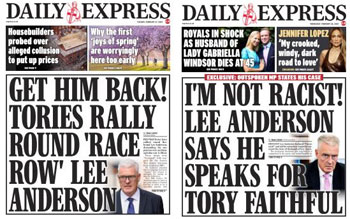
This has now reached the pitch where anyone who criticises Israel is branded “anti-Semitic”, while anyone who supports innocent Palestinians is an “Islamist hate marcher”. When Ellwood’s house was targeted and when protesters beamed “genocide” on the Elizabeth Tower, the Express was understandably outraged and splashed the stories. When Lee Anderson was stripped of the Conservative whip after claiming that Sadiq Khan was being controlled by Islamists, the outrage was not about what he had said, but about Red Wall Tories demanding his reinstatement (a day after the Telegraph). When even Rishi (he of the constant vowing – more of that later) couldn’t stand by his former deputy chairman, disowning his words and suspending him from the party, the paper still gave him a platform to plead his “I’m not racist” case and double down on his remarks with a splash and inside spread.
Memories of the Holocaust in the last century and the rise of Islamic terrorism in this have led some to reduce the complex politics of the Middle East to “Jews good, Muslims bad”. Which is not helpful. It is absolutely right that our country’s 270,000-strong Jewish population should not live in fear. But we should also remember that there are just under four million Muslims who should also be allowed to go about their daily lives without vilification. There will be people among both communities who would do harm to others, given the chance. We have police and security services whose job it is to deny them that chance. The rest of us should, dare I suggest, concentrate on creating harmony rather than fomenting friction.
Chaos in the Commons
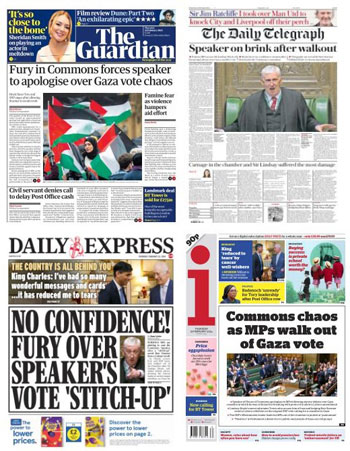
And that includes the politicians of all colours and the press who took sides after the shameful scenes in Westminster over the SNP’s opposition day Gaza motion. The idea that the SNP should frame its motion in such a way so as not to express the country’s disquiet but to maximise embarrassment for a rival party beggars belief.
Everything that grew from that – the Labour and government amendments, Starmer “leaning” on Sir Lindsay Hoyle, his interpretation of the rules, the Tory exploitation of his discomfort in the hope of getting him out and their own man or woman in – served only to tarnish our international image further. And, as day follows night, the rightwing papers were all there the next morning, cheering on their own team, baying at the “other side” and pushing their own partisan agendas – the Telegraph leader headline was “Starmer has brought shame on Labour”. For the Mail, Starmer had “browbeaten” the Speaker to avoid a rebellion and to court favour with pro-Palestinian voters.
Over at the Guardian, the leader held Hoyle responsible for “the mess”, but said he should stay. The Times was pretty well alone in taking a more rounded view – seeing errors on all sides – before concluding, as did the Mail, that the Speaker should not have allowed threats to parliamentarians to colour his judgment and that the country should not be ruled by fear.
Quite right. But a little more examination of exactly who is threatening MPs – the Sunday Times reported that three had state-funded bodyguards – would be useful. Are they all would-be Islamic terrorists or pro-Palestinian fanatics? If so, it’s right to say so. It’s clear from what we know of what Starmer told the Speaker that at least some are. But my guess is that threats come from all manner of unsavoury and unstable people. And this bears close scrutiny beyond generic “MPs living in fear”.
Getting back to that debate. That was supposed to be about the deaths of thousands of people and the plight of more than a million who had followed Israel’s instructions and gone to Rafah, only to be confronted with the prospect of an all-out military assault. But it turned into party political opportunism that was all about the election and nothing to do with humanity. Meanwhile, Suella Braverman and Liz Truss have been stoking the fire and the Lee Anderson sideshow has become the “will he, won’t he defect?” main attraction. Nauseating.
Express readers in Downing Street
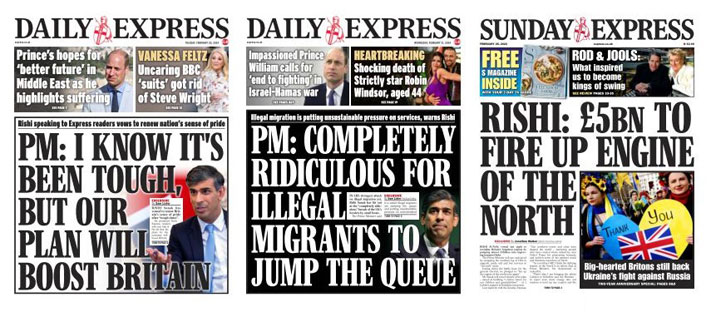
A quick update on the Rishi vowing situation: Just the two from the Express over the past couple of weeks – sticking with the plan and firing up the North. But he also got top billing for saying that it was completely ridiculous for illegal migrants to jump the queue. Which queue – admission to the UK? treatment on the NHS? council housing? – wasn’t addressed in either headline or text.
This splash was the product of an event at which Express readers were invited to No 10 to put questions to the PM on all the important issues of the day – such as does pineapple have a place on a pizza.
It is not clear how this invitation was extended or whether there will be others to, say, Mirror or Guardian readers. And while the five who got to talk to Rishi round the table “in the study that Margaret Thatcher used as her office” were named, how they were chosen was not explained.
In the circumstances, I think it’s fair to add this to the “Rishi promotional splashes” folder. (There is a corresponding – if less bulky – one for Keir and the Mirror that we’ll look into as the election approaches.)
Whose numbers exactly?
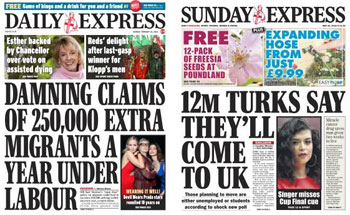
The Express’s Gary Jones has definitely given up on his self-denying ordinance on hostile migration stories. He could have concentrated on what the prime minister had to say to his readers about NHS waiting lists or the cost of living, but he (or Sunak?) chose to major on migration, not only for the splash, but for 90% of the inside spread as well.
He was back on message on Monday with “Damning claims of 250,000 extra migrants a year under Labour”. This was in the same league as the Sunday Express’s preposterous pre-referendum assertion “12m Turks say they’ll come to UK”. At least this time the paper had the decency to use the word “claims”. And boy did that word do some heavy lifting.
How did they reach that number? First, Labour “may” reach a “burden-sharing” pact with Brussels as part of an EU returns agreement. That would account for 127,214 of the quarter of a million “extras” (don’t you just love that precision?). Then Labour “may” reverse the ban on care workers bringing dependants, which would mean another 130,000. And, finally, Labour “may” scrap the Rwanda scheme, which “may ramp up” the figure by a further 10,000. Which all leads me to wonder why the splash head was rounded down when it could have been 267,214.
It's reasonable to assume, I think, that Starmer would scrap Rwanda. But, given that no one has yet been flown to Rwanda and the deal with Kigali isn’t for anywhere near that number – in total, let alone annually – it’s hard to see how this can be counted as 10,000 “extras” per year.
The same applies to the care workers’ dependants. The ban has only just been introduced. The expected decrease in net migration has yet to be demonstrated. Even if it were to be achieved, and the figures are correct, we would simply be returning to where we are now. There might be 130,000 more than there would be if the Tories won the next election, but there will not be 130,000 “extra” compared with where we are today.
Finally, the 127,314 that would come from “cosying up” to Brussels. Labour has said it would seek to join the EU returns agreement. The Conservatives say that in return they would agree to a “burden-sharing” pact – and that is where the figure comes from. Labour has said repeatedly that it will not opt into any EU asylum scheme or accept migrant quotas. Starmer is notorious for his U-turns. It seems the Express has decided that this would be another.
So where did these claims – dismissed by Labour as “total garbage” – come from? A 20,000-word study entitled “The Prospective Immigration Policy of Sir Keir Starmer’s Labour Party”, published by Henry Jackson Society. The what? The Express doesn’t enlighten readers. Not even so far as to say that it’s a think tank. One that describes itself as a “non-partisan transatlantic foreign policy and national security think tank”, but which others describe as rightwing and “neoconservative”.
Michael Gove is a former director and a signatory to its statement of principles; Douglas Murray, who is known for his forthright criticism of both Islam and immigration, is a former associate director. One of its founders has denounced it for becoming “a far-right, deeply anti-Muslim racist propaganda outfit to smear other cultures, religions and ethnic groups”.
That may or may not be a fair appraisal of the society, but the fact remains that its study is an outline of what it thinks a Labour government’s immigration policy will be. It actually says it’s “inferred”. It is not fact and, as such, cannot be damning – as the splash head asserts. Labour rejects the report as “full of fabrications, false figures and invented presumptions”. But the Express believes it anyway, accusing Starmer in a leader of “inflaming the issue” (of migration, presumably, though how is unclear – he didn’t publish this selective interpretation of his policy) and referring to the “bombshell report” on the impact of Labour’s plans before explicitly turning the coming general election into a vote on migration.
It may be that the Henry Jackson Society’s predictions come to pass, that the Express will be proved right. But for now, the job of a newspaper and its editor is to separate facts from surmise and to be honest about where the opinions it is passing on are coming from. Still, at least it had the grace to run that “total garbage” quote up high.
Alexei Navalny
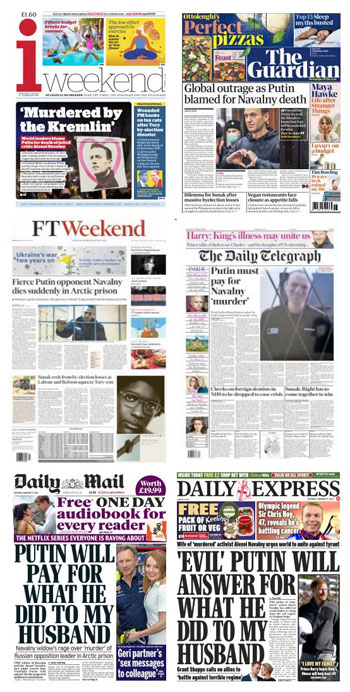
News doesn’t have to be surprising to have an impact. No one could say that the death of Alexei Navalny was unexpected, but when I read about it, it took my breath away like a punch to the stomach. Then his wife Yulia appearing on that stage at the Munich conference, so soon after the announcement. Such composure, such bravery. Surely this was the nailed-on front page for all our nationals.
And then I saw the next day’s Mirror. “Harry: I love my family”. What? Plus the new presenters of This Morning and a couple of freebies. Well, it was a Saturday. But it still felt like an aberration. Navalny made his appearance on page 13, well behind (among other things) more Harry, more Cat and Ben, the Madeleine suspect in court on an unrelated charge and Sunak being in “deep, deep trouble”.
The Sun was also looking across the Atlantic to the wayward Prince, depicting him as “Yankee Harry” in a “royal nationality shock”. Harry had given a brief TV interview to promote the Invictus Games and had been asked if he had considered becoming an American citizen. To which he had replied, yes, he had. Considered it, that is. That was enough. Navalny’s death made a single under the titlepiece and a spread on 12-13.
Everyone else splashed on Navalny. Apart from the Times. Which also preferred Harry. In this case him “seeking a return” to royal duties. Which wasn’t what the story said – it said he was offering to step in while the Firm was short-staffed what with the King and Kate being off sick. Navalny was the picture (a waist-depth portrait of him in an open-necked blue shirt in a slot that must have been earmarked for Keir Starmer in an open-necked blue shirt, whose biography extract was relegated to the puff) and a single column. There were three pages and a decent obit inside – but, here again, the Harry spread took precedence on pages 4 and 5, against Navalny’s 8-10.
Come on! This is just bonkers. What on earth were they thinking of? The Times is supposed to be a serious paper. But it’s like the Johnson shopping trolley, veering from rationality and moderation to cruel obsessiveness via some barking mad news judgments. This was one of them.
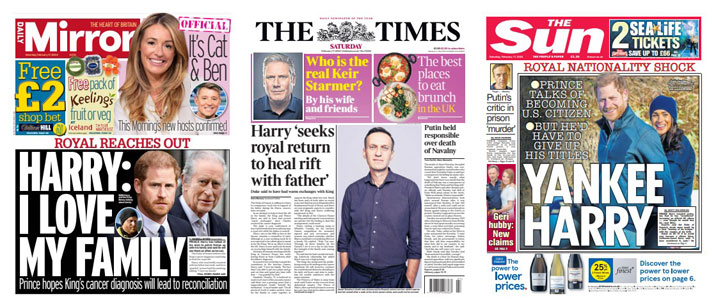
(Some) royals turn out for King Constantine memorial
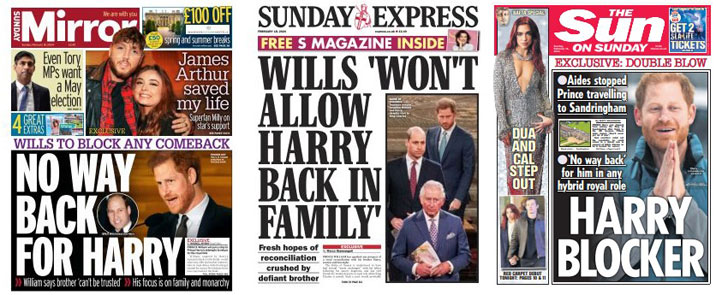
In any case, those reported dreams of a return to the royal rota were swiftly dashed. Wills had put his foot down, as all but one of the Sundays exclusively reported the next day. No way back! Harry blocker! Wills won’t allow Harry back in family! The outlier was the Sunday Times, which puffed Camilla Long on “Why Harry should come back”. Oh dear.
The Prince’s interview and its fallout was just the start of a busy fortnight for the court corrs. The Mirror has splashed on the royals five times, the Sun three, the Mail twice and the Express just the once (it’s been too busy with Muslims and migrants). We’ve had William talking about Gaza, the King feeling better and being pictured with the prime minister, the death of Lady Gabriella Windsor’s husband, William missing the memorial for King Constantine and Prince Andrew parading himself (and his ex-wife) at the front of the royal contingent at that service. And, today, Harry losing his latest court case, this one about his security.
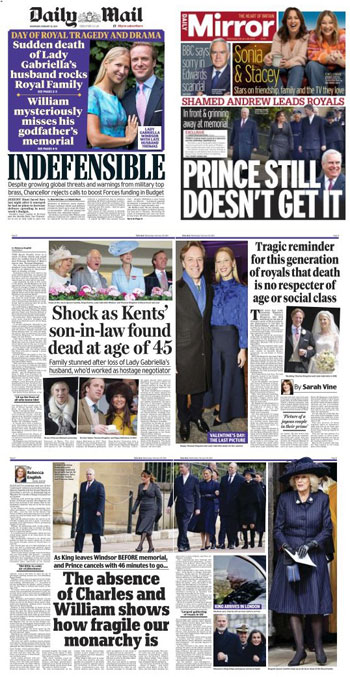
So much to cover… the Mail needed a half-page puff and its first two spreads for the “tragedy and drama” (drama? Isn’t that a bit naff?) of Thomas Kingston’s death at the age of 45 (including the Sarah Vine wisdom that death is no respecter of age or social class) and the memorial service yesterday.
Most coverage of the Constantine memorial focused on the absence of the Prince of Wales, but the Mirror splashed on “shamed Andrew”, who “still doesn’t get it”. He had, it said, sparked fury by leading the royals into the church “grinning away” and with his “limelight-grabbing antics”. I particularly liked the juxtaposition of these sentences: “One Epstein victim said: ‘Anyone looking at the images would think he had not done a damn thing wrong.’ Andrew denies wrongdoing.”
I’m not sure that Andrew’s appearance was more newsworthy than his nephew’s short-notice withdrawal from the event for “personal reasons”. The Prince of Wales has a wife convalescing after what appears to have been a serious operation. He may have needed to be with her, he may have needed to undertake some half-term childcare duties. Who knows? A private matter kept him away from a private function. It’s none of our business.
Or is it? That’s the thing with the royals, everything is guesswork and speculation. But in the middle of the Mirror’s outrageous prince spread was a panel with an updated condition report on the Princess of Wales. She, it said, “continues to be doing well”. This was rendered in the headline as “Kate’s still doing great”. You would have thought so soon after the “hale and hearty” interpretation of the King’s appearance at Sandringham the day before his cancer diagnosis was announced, that the Press might pause before over-interpreting small snippets of royal health information. Anyone who has reported on accident victims knows that “continues to do well” is medic-speak for anything from “holding on” through “doing ok” to “really on the up”. It is the ultimate in non-committal. It does not mean “doing great”.
Fanning the flames
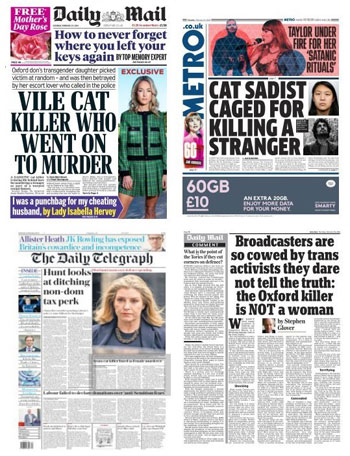
From one hardy perennial to another: the “trans debate”. Last time we met, a woman called Scarlett had been convicted and jailed for killing a transgender teenager. This time, a trans woman called Scarlet has been convicted and jailed for killing a random man on the street.
The notable thing about this case was that the murderer had previously tortured and killed a cat and filmed the atrocity. This told us more about the person than his / her gender ever could. It also gave journalists the escape route of being able to use the gender neutral “cat killer” in headlines and intro without having to decide whether to go for “trans woman” or just “woman”.
But they could only delay the inevitable. A decision had to be made. Some, like the Express and Sun, went straight in with “a trans woman…”, others, including the Guardian, mentioned it in the third or fourth par. The Times, which I accused last time of being obsessed, left it almost to the end of the story, going for “the daughter of an Oxford fellow…”
The Mail also dragged the academic father into the mire in a strap that started “Oxford don’s transgender daughter…” (I thought there was a convention that innocent people shouldn’t be tarred with their relatives’ crimes – sins of the father and all that?)
As ever, the most important person in all this is the victim – Jorge Carreno. Inevitably, they all concentrated on the killer – not, at first, because of the trans issue, but because of the cat. It magnified the nastiness. And that, as we saw with the Brianna Ghey case, is what the press likes to do: to look for motives, to poke around in the background – that Oxford fellow line is a variation on “came from a normal, middle-class background”.
At this point, it was almost refreshing to see that reporters and editors appeared to have stopped to consider whether and how important the fact that the defendant identified as a woman was to the crime and to the story. Would they have put “gay” in the headline or intro if the killer’s sexuality was irrelevant to the murder? This actually seems to have been a question they might have asked themselves. They would certainly have put in “blind” or “one-legged”, relevant or not. The trans element was a factor that added to the portrait of the killer, but it wasn’t the key feature. Or may not have been.
But then came the question of where the life sentence should be served – remember the uproar when a self-identifying trans rapist was sent to a women’s prison. In this instance, the killer – who has not transitioned but said that she had identified as female since she was 12 – is being sent to a men’s jail.
Everyone else seemed content to drop the story, but JK Rowling tweeted “Enough of this shit...” The killer was not a woman, “these are not our crimes”. This brought the whole thing back to life. Everyone thought again and reported what she had to say. Hang on a minute, it wasn’t just about which pronoun to use. The leader writers and columnists weighed in – Allison Pearson, Allister Heath, Stephen Glover among them – and the anti-woke intolerance bandwagon was soon scuttling down the hill at an ever-increasing pace.
This morning, Scarlet Blake made the front of the Telegraph for the second time this week – even though her conviction and sentencing had warranted only inside coverage. The first time was when JK Rowling had her say. Today the story is that the crime will be logged in official records as one committed by a woman. It is an interesting topic, one that can rightly be debated – as the paper rather crudely put it in its leader, the killer had no documentation to show the court to justify the demand to be called “she” or treated as female. But a page one topic? Is this case so important that it takes up a story and the above-the-titlepiece puff (to Heath hailing Rowling a national heroine who should at the very least be a dame or a peer) on the front page? Or is it just a useful weapon in prosecuting a wider war?
If a trans person commits a crime, they are as open to public shaming as anyone else. If their gender is a factor in the offence, then it is right and proper that it should be given due prominence – just as it would be with a woman killing her husband or a man raping a teenager. There are also legitimate questions to be asked about the treatment of trans offenders, how they should be classified in official records and where they should be incarcerated. But to take one nasty person and use them as a stick to beat anyone showing consideration to others in the use of a pronoun and, in the process, increase public antipathy to a vulnerable section of society strikes me as cruel and vindictive.
Forget Scarlet and Scarlett. Remember Jorge.
Who made the Bafta front pages?
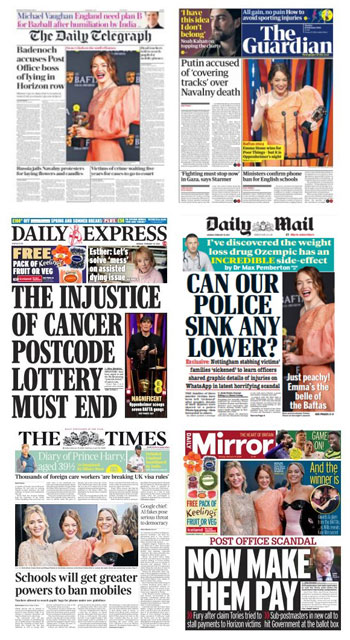
Are you ready for the gowns and the gushing? It’s Oscars night on Sunday week. The west coast timings mean we’ll get news of the winners on the Today programme and a bit more coverage on the lunchtime bulletins, but if we haven’t caught up by then, we’ll struggle to learn from the mainstream media who won what – unless the Brits do fantastically well. It’ll all be hopelessly late for the Monday papers, so the best we can expect is early red-carpet shots from most of them, followed up on Tuesday with “winners and losers” in the frocks stakes.
But never mind, we’ve just had our own “Oscars” in the form of the Baftas (the film awards, that is – the TV ones come separately in May). Even here on home turf, the timing is not ideal for the dailies, with the big prize being awarded around 10pm, but there was enough going on before that to provide something for most titles.
I was intrigued, therefore, by the priorities in choosing the front-page pic: the most glamorous dress? The biggest name? Local talent? Since most will almost always go for a woman in any circumstances, the best actress winner is the usual choice. And so it was: Emma Stone in an orange flouncy number, with her gong, on the covers of the Mail, Guardian and Telegraph (which got the name of her film wrong in the first, but corrected for the second).
The Times and Mirror went to press with her flanked by fellow nominees Emily Blunt and Margot Robbie in a pre-ceremony photograph. Did they think “three for the price of one”, since neither changed up later? The i had a host of winners at the top of its page, with Stone in the foreground, while the Express broke from the crowd with Cillian Murphy, the closest thing to a home-grown acting winner. If he triumphs in Los Angeles, too, I expect he’ll get more cover coverage.
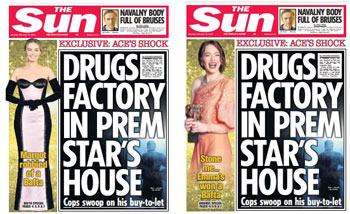
And the Sun? The Sun had bet the house on Barbie and went with Robbie for the first, under the headline “Margot robbied of a Bafta” (did it really think she should have won or was it so enamoured of its pun that it ignored the obvious inference?), before changing up to “Stone me!” later. The initial choice seems all the more strange when you consider that the Sunday paper’s preview had correctly predicted all four big winners. Until you look more closely at that “Bafta special” and its promise of a “Margot special” in the Fabulous magazine. Ah, that explains it. Bad luck, chaps.
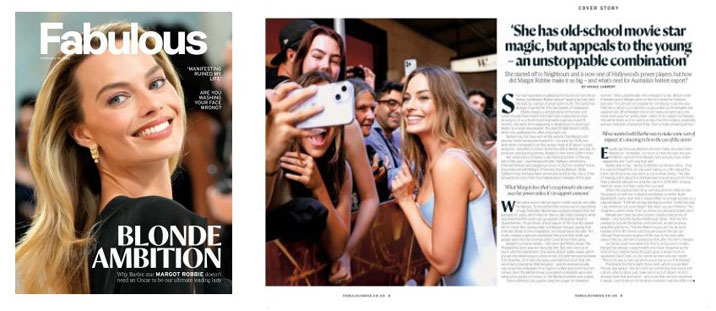
What I found surprising in all the inside coverage was the relatively short shrift given to Oppenheimer, which pretty well swept the board. We expect the frocks to dominate, but most just gave Murphy – probably the most widely known and liked among the contenders, courtesy of Peaky Blinders – a postage stamp. Well, he’s Irish, isn’t he? London-born director Christopher Nolan was given similarly tiny drop-ins. Well, no one knows his face, do they? Here’s Emily Blunt, who didn’t win, but is at least British and female, instead. And Carey Mulligan, who wasn’t even in the running.
Even more overlooked was Samantha Morton, who was awarded the Bafta fellowship and gave an emotional speech about children in care. You’d expect the Guardian and Mirror at least to show an interest, but only the Times did, in its Saturday preview.
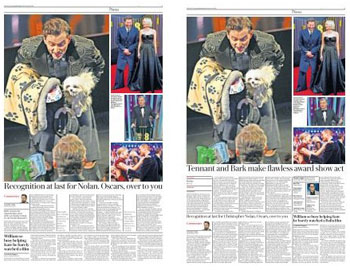
With almost every title, it feels as though there is a template ready to go and all the people on duty have to do is fill in the holes, regardless of how events pan out. An exception to this, albeit a rather weird one, was the Telegraph. The first edition was a straight report on Oppenheimer’s triumph, with a secondary piece on Prince William (guest of honour) not having time to go to the pictures. The main photograph was kilted MC David Tennant holding a pooch and poo bags in one hand and a blanket and dog bowl in the other, bending over to talk to an audience member – a back view of Michael Sheen. If you didn’t see it, the Staged duo had confected a pre-show riff on Sheen needing a dog sitter at short notice and Tennant asking various stars to help him out before emerging at the Festival Hall with all the canine paraphernalia, only to find Sheen sitting in the front row.
And for the second? No change on the picture front, but the report of the results was downgraded to be replaced by a TV review built around, guess what? Yes, the dog skit. All very jolly. But, my word, it looked dated next morning.
As, of course, will this commentary 10 days after the event. Can’t wait to see what they do with the Oscars.
Front page of the fortnight
Well, here’s a scoop and a half from an unexpected source. Well done, my Sun.
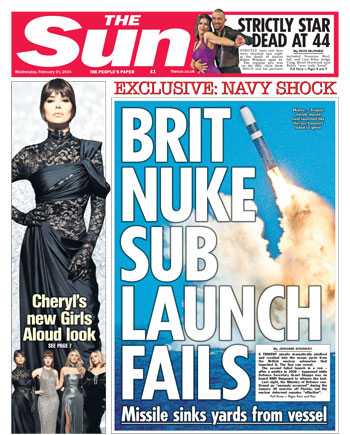
Liz Gerard’s Notebook is a fortnightly column published in the InPubWeekly newsletter. To be added to the mailing list, enter your email address here.







